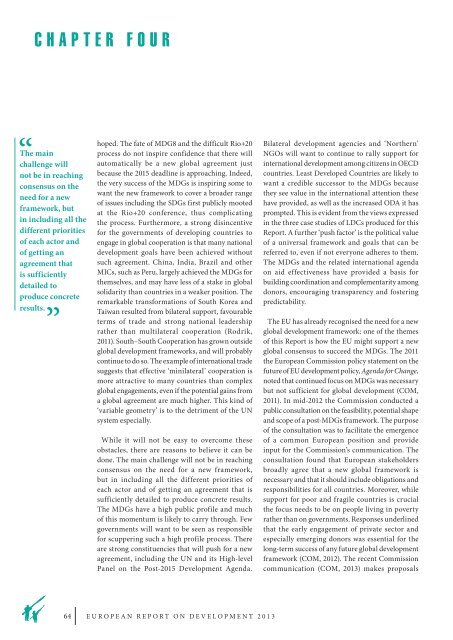Post 2015: Global Action for an Inclusive and Sustainable Future
Post 2015: Global Action for an Inclusive and Sustainable Future
Post 2015: Global Action for an Inclusive and Sustainable Future
Create successful ePaper yourself
Turn your PDF publications into a flip-book with our unique Google optimized e-Paper software.
CHApTER FOuR<br />
The main<br />
challenge will<br />
not be in reaching<br />
consensus on the<br />
need <strong>for</strong> a new<br />
framework, but<br />
in including all the<br />
different priorities<br />
of each actor <strong>an</strong>d<br />
of getting <strong>an</strong><br />
agreement that<br />
is sufficiently<br />
detailed to<br />
produce concrete<br />
results.<br />
64<br />
hoped. the fate of mDG8 <strong>an</strong>d the difficult rio+20<br />
process do not inspire confidence that there will<br />
automatically be a new global agreement just<br />
because the <strong>2015</strong> deadline is approaching. Indeed,<br />
the very success of the mDGs is inspiring some to<br />
w<strong>an</strong>t the new framework to cover a broader r<strong>an</strong>ge<br />
of issues including the SDGs first publicly mooted<br />
at the rio+20 conference, thus complicating<br />
the process. Furthermore, a strong disincentive<br />
<strong>for</strong> the governments of developing countries to<br />
engage in global cooperation is that m<strong>an</strong>y national<br />
development goals have been achieved without<br />
such agreement. china, India, brazil <strong>an</strong>d other<br />
mIcs, such as peru, largely achieved the mDGs <strong>for</strong><br />
themselves, <strong>an</strong>d may have less of a stake in global<br />
solidarity th<strong>an</strong> countries in a weaker position. the<br />
remarkable tr<strong>an</strong>s<strong>for</strong>mations of South Korea <strong>an</strong>d<br />
taiw<strong>an</strong> resulted from bilateral support, favourable<br />
terms of trade <strong>an</strong>d strong national leadership<br />
rather th<strong>an</strong> multilateral cooperation (rodrik,<br />
2011). South–South cooperation has grown outside<br />
global development frameworks, <strong>an</strong>d will probably<br />
continue to do so. the example of international trade<br />
suggests that effective ‘minilateral’ cooperation is<br />
more attractive to m<strong>an</strong>y countries th<strong>an</strong> complex<br />
global engagements, even if the potential gains from<br />
a global agreement are much higher. this kind of<br />
‘variable geometry’ is to the detriment of the un<br />
system especially.<br />
While it will not be easy to overcome these<br />
obstacles, there are reasons to believe it c<strong>an</strong> be<br />
done. the main challenge will not be in reaching<br />
consensus on the need <strong>for</strong> a new framework,<br />
but in including all the different priorities of<br />
each actor <strong>an</strong>d of getting <strong>an</strong> agreement that is<br />
sufficiently detailed to produce concrete results.<br />
the mDGs have a high public profile <strong>an</strong>d much<br />
of this momentum is likely to carry through. Few<br />
governments will w<strong>an</strong>t to be seen as responsible<br />
<strong>for</strong> scuppering such a high profile process. there<br />
are strong constituencies that will push <strong>for</strong> a new<br />
agreement, including the un <strong>an</strong>d its High-level<br />
p<strong>an</strong>el on the post-<strong>2015</strong> Development agenda.<br />
EuropE<strong>an</strong> rEport on DEvElopmEnt 2013<br />
bilateral development agencies <strong>an</strong>d ‘northern’<br />
nGos will w<strong>an</strong>t to continue to rally support <strong>for</strong><br />
international development among citizens in oEcD<br />
countries. least Developed countries are likely to<br />
w<strong>an</strong>t a credible successor to the mDGs because<br />
they see value in the international attention these<br />
have provided, as well as the increased oDa it has<br />
prompted. this is evident from the views expressed<br />
in the three case studies of lDcs produced <strong>for</strong> this<br />
report. a further ‘push factor’ is the political value<br />
of a universal framework <strong>an</strong>d goals that c<strong>an</strong> be<br />
referred to, even if not everyone adheres to them.<br />
the mDGs <strong>an</strong>d the related international agenda<br />
on aid effectiveness have provided a basis <strong>for</strong><br />
building coordination <strong>an</strong>d complementarity among<br />
donors, encouraging tr<strong>an</strong>sparency <strong>an</strong>d fostering<br />
predictability.<br />
the Eu has already recognised the need <strong>for</strong> a new<br />
global development framework: one of the themes<br />
of this report is how the Eu might support a new<br />
global consensus to succeed the mDGs. the 2011<br />
the Europe<strong>an</strong> commission policy statement on the<br />
future of Eu development policy, Agenda <strong>for</strong> Ch<strong>an</strong>ge,<br />
noted that continued focus on mDGs was necessary<br />
but not sufficient <strong>for</strong> global development (com,<br />
2011). In mid-2012 the commission conducted a<br />
public consultation on the feasibility, potential shape<br />
<strong>an</strong>d scope of a post-mDGs framework. the purpose<br />
of the consultation was to facilitate the emergence<br />
of a common Europe<strong>an</strong> position <strong>an</strong>d provide<br />
input <strong>for</strong> the commission’s communication. the<br />
consultation found that Europe<strong>an</strong> stakeholders<br />
broadly agree that a new global framework is<br />
necessary <strong>an</strong>d that it should include obligations <strong>an</strong>d<br />
responsibilities <strong>for</strong> all countries. moreover, while<br />
support <strong>for</strong> poor <strong>an</strong>d fragile countries is crucial<br />
the focus needs to be on people living in poverty<br />
rather th<strong>an</strong> on governments. responses underlined<br />
that the early engagement of private sector <strong>an</strong>d<br />
especially emerging donors was essential <strong>for</strong> the<br />
long-term success of <strong>an</strong>y future global development<br />
framework (com, 2012). the recent commission<br />
communication (com, 2013) makes proposals

















